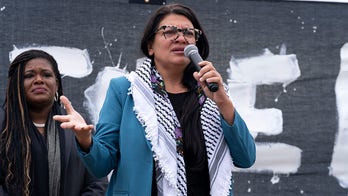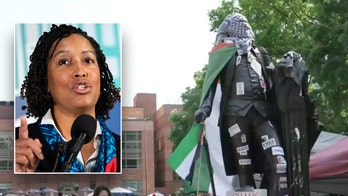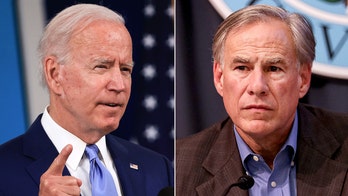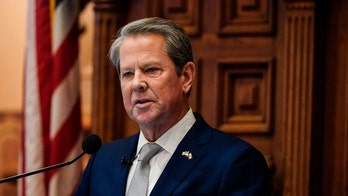The Bourbon Room had a long talk today with Susan Estrich, the campaign manager for Michael Dukakis' 1988 presidential campaign. Estrich is also a lawyer, a veteran of years of Democratic party intrigue, campaigns, personalities, and convention floor struggles. She has suffered the wounds and knows the joys of high-stakes party politics that can only be experienced when you operate at its epicenter. Estrich is at the University of Southern California now, where she's a professor in its law school and in its undergradute political science department. Like Barack Obama, Estrich is Harvard Law graduate and, like Obama, made history at the Harvard Law Review. Estrich was its first woman president/editor-in-chief while Obama was its first African-American president/editor-in-chief.
The Bourbon Room is grateful to Fox's Dominque Pastre for producing the transcript for this post.
Q: Obama had two press conferences Wednesday, the second to explain what he meant about Iraq. Is this a sign of a problem with his Iraq policy?
Estrich: Between having two press conferences on the same subject and having one or none, I would always pick one. But if there is a day you have to have two press conferences to explain, you couldn't pick a better day than the Thursday before the Friday of the Fourth of July. Because I think, for better or for worse, the number of people paying attention Thursday afternoon to politics as opposed to beer, NASCAR, hotdogs, or the beach is probably pretty small.
Q: Is this about a legitimate examination of a policy switch or did Obama say what he's always said but with different emphasis?
Estrich: Well, I think the level of scrutiny changes in a campaign. And the level of attention changes. Candidates have to adjust to that and that's what you're seeing happening. He was a primary candidate running against Hillary Clinton, who basically agreed with him on the war, running for the Democratic primary base. And now that's changed. Now he's running against John McCain. He's got to create a little more room around him and he should. Besides which, the issues are changing and the press scrutiny is going to be more intense. I think he's just getting his grounding on that.
Q: Is there any risk of Obama losing support among the anti-war left on Iraq?
Estrich: Here’s the reality of the situation. If you're against the war there are two candidates in this race: One talking about getting the troops home, whether it's in 3 months or 18 months or whatever it is; and the other talking about a hundred year war. I think the good news for Obama is that if he is indeed moving to the center his base in the anti-war left is certainly secure . And you know, there's nowhere to go. The danger for Obama is not an ideological danger. The danger is not that he's not going to be quote liberal enough or that the anti-war left will be pissed off. The only danger he faces is that for moderates the issue will be ‘Is he experienced enough, is he savvy enough, does he know foreign policy?’ So, the challenge for him as he does the dance as every candidate does once they secure the nomination, is to make sure he doesn't look like -- to quote John Kerry -- he voted for it before he voted against it, or against before he voted for it, to make sure he doesn't reinforce the potential negative of inexperience.
Q: The McCain campaign thinks its found an opening, not so much on Iraq but on a broader depiction of Obama as someone who lacks fixed positions. Any danger there?
Estrich: He doesn't want to be branded as a flip-flopper. No politician wants to be branded as a flip-flopper. But I don't think the Iraq situation is nearly as clear-cut as the case they had against John Kerry, for instance, four years ago with voting for it before he voted against it. I think the only clear flip-flop that Obama has done is on campaign finance. And while that happens to be an issue that I care passionately about, there's about a couple dozen of us who do. The reality is that campaign finance is not a voting issue in the general election. So, I don't think he'll take much heat for switching on that issue, the issue of taking public finance. And I think on Iraq it’s a matter of degree. And he's still on the right side, which is to say the left side of that issue for most voters.
Q: Obama is in Montana today. He was in North Dakota yesterday. Do you think he can expand the electoral map?
Estrich: They can take McCain on in some of these states and I think it’s bold and aggressive and smart early in July to be expanding the battlefield, as it were. If you asked me, ‘Do I think Montana is going to be the decisive state for Barack Obama to become president?’ No, I mean I think its much more likely to be Florida and Michigan and Ohio and New Jersey and California and the big states where Democrats win. But I think it does make sense to take the challenge to McCain and take the challenges to Republicans and some of their strongholds. And that's what he's doing, particularly in July. It forces McCain to defend himself where he shouldn't have to defend himself, according to the conventional logic. And makes it more difficult, particularly when you realize that Obama is going to be able to outspend McCain handily. It makes it more difficult for McCain simultaneously to be fighting in places that should be secure and to be taking the fight to Obama in places like Ohio and Michigan.
Q: You know timing counts for a lot in politics and perhaps if the party was as unified in 1988 as it was will Bill Clinton ran in 1992, things might have turned out differently for Dukakis. Obviously, Ross Perot played a role in Clinton's race, but Democrats appeared hungrier to win in that race than in '88. Do you sense a heightened level of Democratic unity and hnger to win this year?
Estrich: I think the base is going to stay and I think the base is very enthusiastic. But what remains to be seen, quite frankly, is how big a role race is going to play in this election; whether the phenomenon that we saw to some extent in the democratic primaries of the polls just not being right will carry on to the general election. We call it out here in California the Bradley effect in memory of the late (Los Angeles Mayor) Tom Bradley who was all to be governor of California (during the 1982 gubernatorial general election) and won every poll, including the exit polls. The only one he lost, and he was African-American, was the one that took place in the voting booth. And he lost that one handily. It remains to be seen what impact race will have in this election. It remains to be seen how reliable these polls are. And it remains to be seen whether the phenomenon we saw in the primaries of white working class voters having some issues with Obama will be aggravated in a general election where you have white general election voters who have got to come to his side.
Q: The Washington Post ran a poll that found 30 percent of the respondents said race played a factor in the way they look at politics. http://www.washingtonpost.com/wp-dyn/content/story/2008/06/22/ST2008062200049.html What do you think of that?
Estrich: Rasmussen Reports asked the question and he said you know, will it affect your friends and family. You can never ask people, basically, ‘Are you a racist?’ Because everybody knows what the right answer is. And so its stunning that anyone says ‘Well I wouldn't vote for an African-American.' So the way Scott Rasmussen asked it was he said ‘Ya know, do you think your friends and family would have trouble voting for an African-American?’ And 40 % of white voters said yes. My guess is that if 40% of people actually said yes, the real number is probably even higher. So there's an obstacle here. But Barack Obama is determined to take it on. So, if this isn't a Democratic year, I don't know what a Democratic year looks like.




